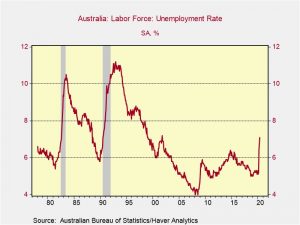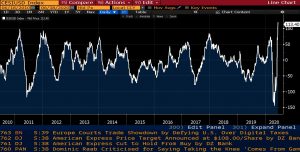Daily Comment (June 18, 2020)
by Bill O’Grady, Thomas Wash, and Patrick Fearon-Hernandez, CFA
[Posted: 9:30 AM EDT]
Good morning! U.S. equity futures are weaker this morning, but off the worst levels of the overnight session. Our usual commentary on COVID-19 is available. We cover a myriad of policy issues this morning, including global taxes and the increased scrutiny facing U.S. tech firms. In policy, a number of central banks took action overnight. Australia looks like it is in recession and we examine the difference between expectations and reality in the economic reports. The Weekly Energy Update is available. Here are the details:
COVID-19: The number of reported cases is 8,367,894 with 449,397 deaths and 4,091,978 recoveries. In the U.S., there are 2,163,894 confirmed cases with 117,717 deaths and 592,191 recoveries. For those who like to keep score at home, the FT has created a nifty interactive chart that allows one to compare cases across nations using similar scaling metrics. Additionally, we have the weekly Axios U.S. state map.
Virology:
- India is becoming a global hot spot for the virus. Given its population density, the chances the virus will spread in India are elevated.
- The rise in infections around Beijing has coincided with news reports of finding the virus in fish. Although this discovery was mostly accidental (most likely the fish was processed or handled by an infected worker) it has led to a sharp decline in demand for imported salmon.
- As the world awaits a vaccine, there are growing worries about a potential bottleneck; the glass vials used to distribute doses. Currently, there is a shortage of the vials and the demand for them once a vaccine is developed could overwhelm the industry’s capacity.
- COVID-19 is especially fatal for older people. Nursing homes have seen a high level of fatalities due to the virus.
- South Korea’s experience in managing the virus suggests that maintaining an acceptable level of infections means that returning to a pre-COVID-19 lifestyle isn’t really possible.
- Researchers have found direct evidence that COVID-19 can infect the brain and replicate in that vital organ. Although it isn’t clear if the virus regularly makes its way past the blood/brain barrier, if it does, it will complicate treating the disease.
- Remember mood rings? Now we have a “smart ring” that will reportedly signal when a user is pre-symptomatic with COVID-19. Casinos are planning to distribute them to staff to inform workers and protect patrons.
- Honduran President Juan Orlando Hernandez has tested positive for COVID-19.
Policy news:
- One of the issues that has developed in public finance is taxing multinational corporations. In the U.S., we often see tax breaks offered to companies to move facilities into a state. It can become a race to the bottom as states are continually faced with the need to offer deals to keep companies within the state. Because public goods must usually be provided to the company and workers (workers need police and fire protection, schools and company facilities need the same, plus infrastructure) the incidence of funding these services tends to fall on those who lack the resources to “shop around.” Something similar occurs at the international level. Nations can attract businesses by becoming tax havens. Ireland is perhaps the most developed nation example. Multinational firms have the resources to establish outlets in tax favorable environments and extract subsidies and other support. In an effort to stop this process, the OECD had sponsored talks to harmonize global tax policy. However, in any tax regime, there are those who benefit from the current situation and see little reason to change, and those who want to shift the incidence of a tax to others. Europe has been keen on taxing technology, which, in reality, becomes a tax on U.S. firms. The EU would gain the revenue and the U.S. would mostly bear the incidence of the tax payment. Needless to say, the U.S. isn’t all that supportive of this effort. As a result, yesterday, talks broke down. We would expect the EU to go ahead with digital taxes and the U.S. to treat this move as targeting the U.S. and respond with tariffs and other penalties.
- The tech industry is coming under increased scrutiny as part of the Communications Decency Act. Initially, in the 1990s, the government was concerned if young tech firms were sued for user content, they would be unable to survive and so the industry was given broad protections against lawsuits from user content. So, the Communications Decency Act protected the firms from lawsuits. However, as the firms have grown in size and power, policymakers are taking another look at this issue. For example, Hawley (R-MO) is introducing legislation that would reduce the protections tied to censorship. The DOJ is looking at similar measures to reduce immunity.
- Apple (APPL, 353.94) is facing antitrust investigations from the EU over its app store.
- Chair Powell finished this second day of Congressional testimony yesterday. What we noted was that the Chair does not want Congress to begin withdrawing fiscal support quite yet. He wants some form of jobless benefits to continue, and the extension of other measures as well.
- One of the factors we have been monitoring since 2008 has been the rise of populism which includes opposition to globalization. Within the political parties, this pits the establishment against the populists. This issue has come up again recently, as the Chamber of Commerce warns against restricting visas for foreign workers, indicating that if businesses can’t get these workers from abroad, they will be forced to bid up wages for local workers…which is exactly the point the populists have been making.
- USTR Lighthizer weighed in on the WTO yesterday. The body is searching for a new leader and the U.S. clearly wants to shape global trade policy in a more favorable manner. What we find interesting is that Lighthizer doesn’t want to see the WTO scuttled (as some in Congress do), but does want it to fit trade policy to favor the U.S.
- Several central banks eased credit yesterday, with the notable exception of Taiwan, who kept policy steady. This morning, the BOE expanded QE but didn’t move rates below zero. The PBOC, who so far has been reluctant to expand policy stimulus, appears to be moving to boost growth.
China:
- We continue to monitor the conflict between India and China. The good news is that although there were fatalities on both sides during a recent skirmish, so far, there hasn’t been evidence of military escalation. The bad news is that aggressive rhetoric is rising on both sides that may create conditions that foster future escalation.
- Yesterday, SoS Pompeo and China’s foreign policy chief Yang Jiechi met in Hawaii. It wasn’t clear why the meeting was held and both sides were reticent to discuss the outcome of the engagement. In fact, both sides suggested the other asked for the meeting. We suspect this was about keeping communications open during a period of tensions. It doesn’t appear that there was anything specific to discuss, although if there was, we should see “something” emerge in the coming weeks.
- Although U.S. foreign policy has had a look of “going it alone” in reality, there does appear to be an anti-China coalition evolving. The tensions on the India/China border may reflect Beijing’s growing concern about this development.
- There are increasing reports of human and capital flight from Hong Kong.
- China’s espionage isn’t only centered on the West. A Russian scientist has been accused of passing along classified information to Beijing. Reportedly, the information is tied to submarine detection.
- China is collecting blood samples from a large swath of its population in an attempt to create a massive DNA database. China has been steadily moving to create a high-tech surveillance state; the DNA database is part of widespread cameras, facial recognition and monitoring of financial transactions to monitor the activities of its citizens.
Markets: Insurance companies are reviewing their exposure in collateralized loan obligations (CLOs). CLOs are usually pooled corporate debt, originated by banks. CLOs can be separated into different tranches by credit risk and payment priority. In recent years, insurance companies have been avid buyers of these instruments to take advantage of their higher yield. However, recently, there has been growing concerns about the credit quality of these instruments.
There is a rising level of delayed loan payments. Student loans are showing the highest delinquencies.
Economy news:
- Australia’s May unemployment rate rose much faster than expected, hitting 7.1%, up from 6.4% in April.

The country, which hasn’t had a recession since the early 1990s, is clearly in one now.
- One of the concepts a new analyst always has to learn is that the actual data matters less than the data relative to expectations. Recent data has been far better than forecast.

This chart shows the economic surprise index from Bloomberg. It measures the difference between the actual data and expectations; the data included are weighted based on their effects on foreign exchange behavior. What the index is telling us now is the economic data is coming in much better than forecast. That doesn’t mean the data is good; it means that expectations are so depressed that even soft numbers are still better that deeply depressed forecasts. What we have observed over the years is that the expectations tend to catch up in a few months and so better future data may not look as good, even with the improvement, because expectations will tend to rise even faster. This could lead to “disappointing” economic data by autumn.
- One of the consequences of the lockdowns has been that firms and workers are realizing that they probably don’t need to go to the office to be effective. And, if that’s the case, why would someone stay in a crowded expensive city if they can just as easily live elsewhere. If this becomes a trend, smaller metropolitan areas may benefit from workers moving to new, smaller cities.
- The massive expansion of central bank balance sheets has raised fears of inflation. Japan, which has seen ballooning government deficits, remains susceptible to deflation.


